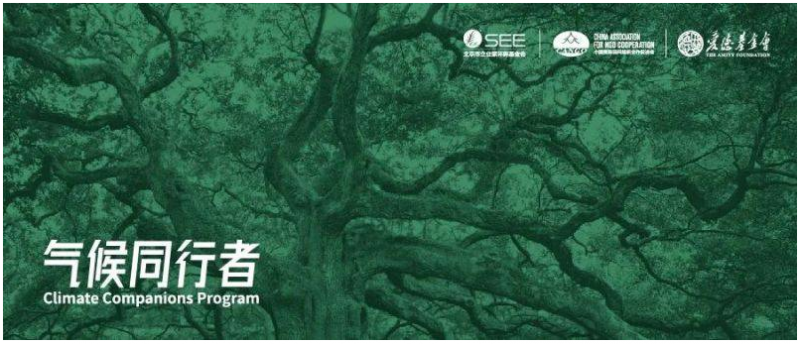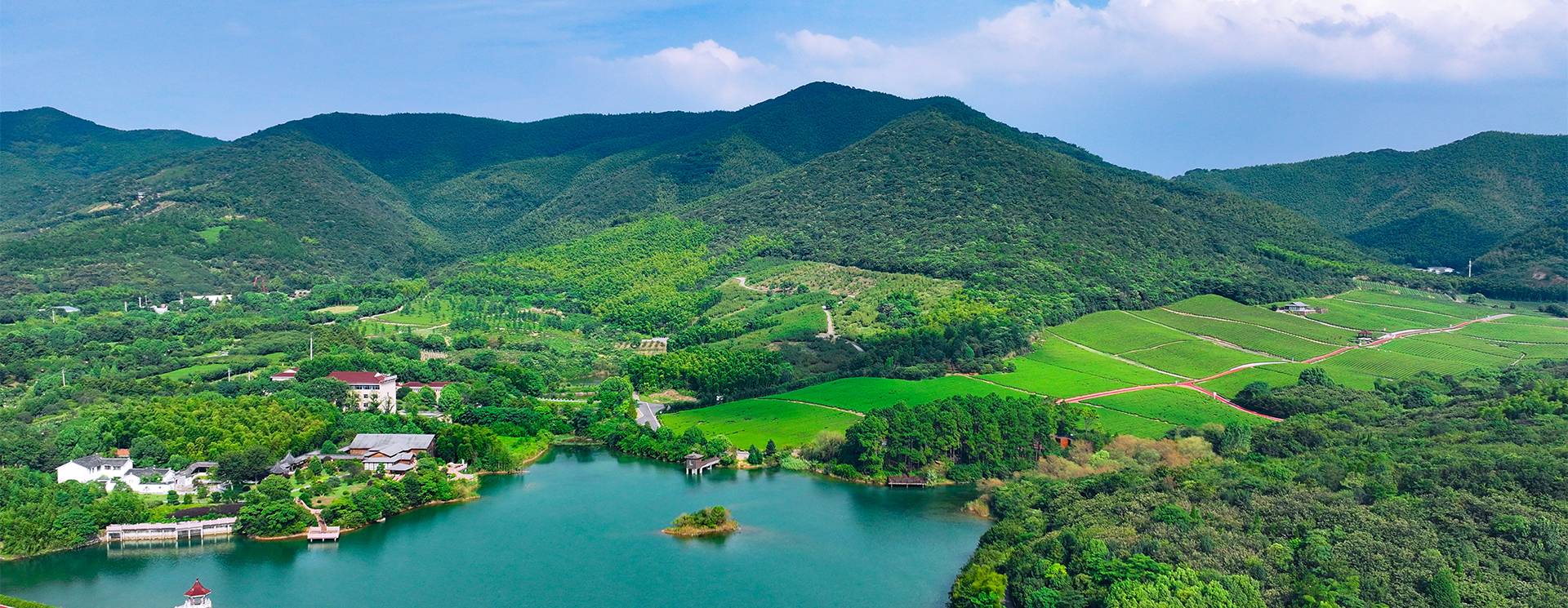
Climate change requires systemic change and, more importantly, the efforts of all sectors of society. However, social organizations in China currently face three core challenges to climate action: shortage of talent, lack of practical methods and tools, and lack of funding. Based on this, at the end of 2023, CANGO, the Amity Foundation and the Beijing Entrepreneurs' Environmental Protection Fund jointly launched the “Climate Peers” program, with the goal of fostering civil society's power to respond to climate change, and committing to supporting and accompanying local social organizations to actively participate in climate action in the next 3-5 years, and to cultivate and empower public welfare partners to jointly explore diversified climate solutions. The program aims to support and accompany local social organizations to actively participate in climate action in the next 3-5 years, cultivate and empower public welfare partners, promote international exchanges, and jointly explore diversified climate solutions. Climate Peers focus on issue areas such as corporate carbon reduction, public engagement, nature-based climate solutions, community resilience, etc., and will focus their work on specific issues each year.
In 2024, the Climate Peer Program is conducting an open call for projects for the community, focusing on the following directions:
Innovative actions for multi-sectoral emission reductions
Increasing community resilience in response to climate change
Development of social organizations in the climate sector
Direction of support I: Innovative actions for multi-sectoral emission reductions
Under the guidance of the national “dual-carbon” goal, domestic enterprises in various fields have gradually started the green and low-carbon transformation path. In the process of low-carbon transition, each industry needs to continuously explore new technologies and methods to improve energy efficiency and reduce carbon emissions, bringing new green development opportunities for enterprises.
At present, in the key industries represented by steel, industry, automobile, manufacturing, etc., emission reduction cannot be delayed, and the market mechanism continues to develop from policy guidance to technological innovation, and then to the continuous improvement of carbon management system. At the same time, enterprises closely linked to daily consumption have also joined the ranks of energy saving and emission reduction one after another, such as the retail industry and the food industry, which are directly connected to the production end and the consumption end, and the logistics and transportation links also have a certain amount of carbon emissions, with a long upstream and downstream supply chain, and affecting a large number of industries with a wide range. At the same time, the daily consumption type of industry is directly related to the public's behavioral choices, the emission reduction benefits generated by such enterprises should not be ignored, and will also have a positive social impact.
The project will focus on industries closely related to daily consumption, such as retail, catering, logistics and warehousing, etc. It will focus on the whole process from production to consumption, promote the circular economy and low-carbon design of enterprises, and explore the space for carbon emission reduction in different industries and business segments.
Scope of support:
The application program is mainly carried out for the retail, accommodation and catering, logistics and warehousing industries;
Projects in the Tools and Methods R&D category are required to be in line with scientific principles and are prioritized if they have potential for industry application;
The Exploring Practices category prioritizes projects with measurable and traceable results;
Applicant organizations in this direction are required to be registered in accordance with the law, and there is no restriction on the type of registration, but the project needs to ensure that it is of public interest.
Scale of support:
Individual applications will not exceed $150,000, and budgets will be approved based on actual project actions, with no more than five projects scheduled for support.
Direction of Support II: Increasing Community Resilience to Climate Change
In recent years, many parts of China have suffered from various major climatic disasters, such as torrential rains and floods in Shaanxi, Shanxi, Henan and Hebei, typhoon disasters in coastal areas such as Zhejiang, and forest fires in the south-west and north-west. These disasters have brought great losses to people's production and life, and the local natural environment and biodiversity are facing many challenges.
In order to reduce the harm caused by climate change-induced disasters to the society, and improve people's ability to adapt to climate change and cope with disasters, the State has put forward the working objective of “significantly improving the defense capability against natural disasters” in the 14th Five-Year Plan, and established an emergency relief system to cope with sudden and major natural disasters, and invested a large amount of money to carry out It has also established an emergency relief system to cope with sudden and major natural disasters, and invested a large amount of funds in disaster reduction and prevention projects.
This project plans to provide support to disaster-prone communities by supporting professional organizations on the front line in related fields, mitigating or responding to the impacts of climate change through community-based climate disaster risk prevention, climate change adaptation and other actions, improving the level of urban and rural disaster prevention and emergency response, and enhancing the resilience of communities. This will lay the foundation for an effective response to climate change, help urban and rural areas develop in a sustainable and high-quality manner, and build resilient homes.
Scope of support:
The current phase of the project prioritizes areas of high climate disaster risk, with projects implemented in predominantly rural communities;
The project takes the community as the main body of action and focuses on enhancing the awareness and capacity of community members to cope with and adapt to climate change;
Project results are measurable, project utility is sustainable, and the project model is replicable;
Priority in this direction is given to non-profit organizations registered in accordance with the law in the domestic civil affairs department, and the applicant institution may be a social group, a privately-run non-enterprise unit or a grass-roots mass self-governance organization.
Scale of support:
A single application will not exceed $150,000 and a budget will be approved based on actual project actions, with 3-5 projects planned to be supported in this period.
Direction of support III: Development of social organizations in the climate sector
Gender inequality and the climate crisis are two pressing global challenges, and by being empowered, women and girls will become leaders and change agents in addressing climate change, the environment and the disaster crisis, contributing to the building of a sustainable future. As global humanity faces the twin challenges of the climate crisis and gender inequality, gender equality in climate change, environmental and disaster risk reduction policies and programs, and the empowerment of all women and girls are critical to achieving gender equality and sustainable development.
In order to enhance the capacity of social organizations to participate in climate governance, improve their capacity in institutional operation and sustainable development, and at the same time, promote the incorporation of gender perspectives in the process of addressing climate change, this phase of the plan will provide development funding for social organizations to promote their growth and development, facilitate communication and collaboration on climate governance, strengthen the field of climate and gender, and related policy discussions and public advocacy activities, and effectively Participate in social governance and contribute to the realization of the Sustainable Development Goals.
Scope of support:
This tranche of support is aimed primarily at social organizations operating around participation in, or incorporating a gender perspective in, climate governance;
Priority is given to non-profit organizations registered in accordance with the law in the domestic civil affairs department, and applicants can be social groups, private non-enterprise units and foundations;
Funds applied for can be used to support specific project activities in the areas of supporting the operational development of social organization institutions, enhancing issue expertise, and promoting issue policy advocacy.
Scale of support:
The amount of support for a single organization will not exceed $200,000, and the number of support will not exceed 3 organizations. The actual amount of support will be adjusted as appropriate according to the size of the organization, the declaration materials and the final evaluation.
Requirements for application
The applicant organization must be an organization that has been carrying out business activities for at least 2 years and is able to provide proof of passing the annual inspection for the last 2 years;
The applicant organization should have basic project design, implementation, dissemination and financial management capabilities, good social credibility and no relevant adverse records.
Each organization can only select one direction to submit an application; this open call does not support an organization to apply in more than one direction.
It is recommended that applications be made for a maximum project implementation period of 12 months.
Event Preview
In order to better guide social organizations to apply for the Climate Peer Group, the organizer will hold the [Climate Peer Group Project Kick-off Meeting and Project Empowerment Training] on April 28th, which will include specific guidelines for project application and training on related topics. Everyone is welcome to participate! Detailed event information will be released later!
More support opportunities
International exchange opportunities: Supporting the participation of project key personnel in international exchange activities related to climate change.
Empowerment training opportunities: Provide a wealth of targeted empowerment training to enhance the professional capacity and innovation of social organizations for climate action;
Climate Talent Scholarships: Partner organizations participating in the project will have the opportunity to receive individual growth funds to support the growth of key talent within the project, with individual scholarships to be set on a project-by-project basis;
Communication and other resource support: The project will integrate communication resources to support partner projects to maximize their impact and expand their effectiveness; and provide other communication and fundraising resources to support the development of partner organizations.
Method of application
Partners applying for the Climate Peer (2024) program should send the following application materials packaged to the designated program email address under the following email name:
Email name: Climate Peer (Industry Emission Reduction Direction/Community Resilience Direction/Organization Development Direction) + Organization Name
Email: climatecompanions@163.com
Required application materials include:
1. Project application form;
2. Project budget sheet;
3. Certificate of institutional registration within the validity period;
4. 2 consecutive years of agency audit report (electronic version);
5. Annual report of the organization for 2 consecutive years (electronic version) or other relevant materials that can prove the work of the organization in previous years;
Browser search t.nxw.so/cmNoR for the application packet.
If you have any questions, please also feel free to send an email to the above email address for inquiries.
Application Process
1. Enrollment stage
Submissions will be accepted from the date of the recruitment release until 24:00 pm on May 15, 2024, whichever is the time the email is received, late applications will not be considered.
2. Due diligence phase
Between May 15 and May 30, 2024, the project team will conduct initial screening and back-testing of applications and notify uncontested project partners to proceed to the defense.
3. Assessment phase
The project defense evaluation meeting will be held in mid-June. The project team will communicate with the partners entering the defense to improve the project materials and prepare for the evaluation meeting. The evaluation meeting will take the form of “online + offline” combination, not limited to the form of defense, partners choose.
4. Agreement stage
The list of project support will be announced within 7 working days after the evaluation meeting. The selected projects will enter the agreement signing stage after the completion of the project announcement period. Projects that have improved their application information according to the evaluation requirements will complete the signing of the contract; those that have not completed the improvement of the project information within the stipulated time will be regarded as giving up the opportunity to apply.
